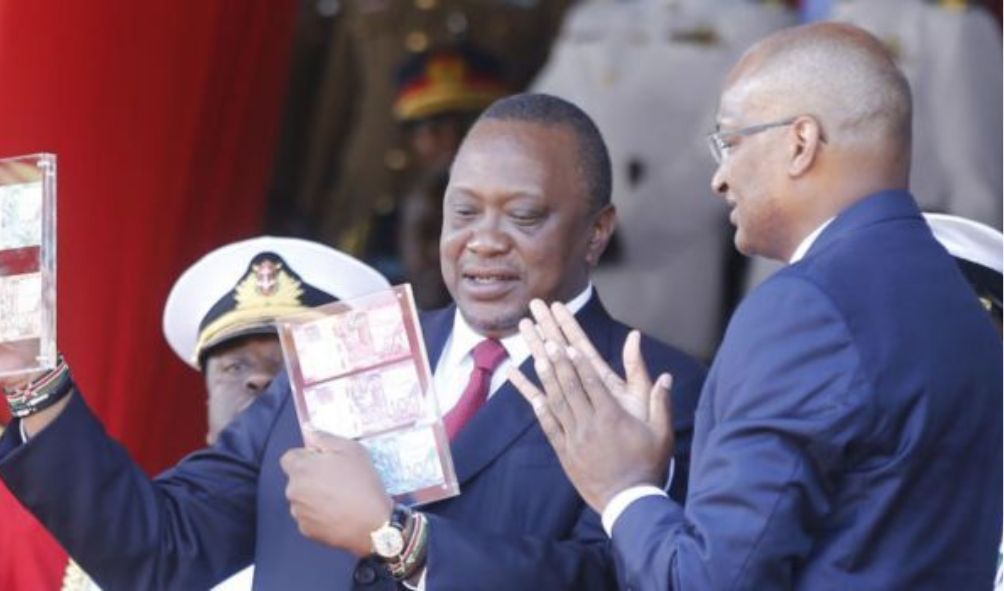How Uhuru decision to phase old notes affected Kenya’s economy

Uhuru decision to phase out old notes yielded expected fruits and met its objective in stabilizing the economy according to the CBK report
Uhuru decision to phase out old notes yielded expected fruits and met its objective in stabilizing the economy according to the CBK report.
Central Bank of Kenya (CBK), on Friday, June 9, released a report demonstrating how the 2019 demonetization of 1,000 Kenya Shillings notes affected the economy.
According to CBK, the decision to switch the currency was motivated by the necessity to deal with concerns including reducing inflation, eradicating counterfeit money, and increasing revenue.
The decree imposed by Retired President Uhuru Kenyatta delivered the expected results and achieved its goal, according to the report signed by outgoing governor Patrick Njoroge.
“The success of the exercise can be measured in several ways. First, the exercise was completed within the set timeline of four months, with the complete changeover to the new notes in that period.
Second, as witnessed in other countries, the exercise was not disruptive to the economy, as key macroeconomic indicators such as inflation and exchange rates remained stable.
“Third, the exercise impacted IFFs, as indicated by the notes valued at Ksh7.386 billion, which were rendered worthless at the end. This was due to noncompliance with the robust anti-money laundering (AML) and combating financing of terrorism (CFT) checks in place,” read part of the report.
The report stated that the exercise carried out between June 1 to September 30, 2019, addressed concerns regarding illicit financial flows (IFFs) and the emergence of counterfeit banknotes that threatened the currency’s integrity.
Central Bank of Kenya explained that it managed to contain illicit financial flows, mainly funds sourced from proceeds of commercial tax evasion, revenues from criminal activities, and public corruption.
The report noted that the success of the exercises hinged on a gradual process, strong engagement with key stakeholders, an extensive public awareness campaign, and a robust framework.
“The gradual process allocated adequate time for withdrawal of the banknotes. The four-month timeline ensured a smooth conversion and adjustment to the new currency across the country, and sufficient time for addressing logistics such as transportation, recalibration of cash machines to the new currency by banks and businesses, and for people to learn the features of the new notes,” read part of the report.
Demonetization also helped reduce the amount of money in circulation, leading to a stronger currency and robust export market.
Gachagua responds to Raila on revealing his father’s Mau Mau service number
Treasury reveals country’s entire debt status and repayment plan
Twenty-two die in ordnance blast in Somalia
Government too broke to remit NHIF funds, Health CS Susan Nakhumicha reveals
Saudi Arabia overtakes China, India and UAE as Kenya’s top import market
The report also observed instances when demonetization led to the disruption of business operations, especially, due to a lack of awareness among some traders.
However, CBK noted that there was minimal disruption because banks worked closely with the Central Bank to ensure that there was an adequate supply of the new notes in all their branches across the country, and to facilitate the exchange of the old banknotes with new ones in line with the indicated guidelines.
Coordination of the process was extended to the East Africa region, to ensure that possible illicit financial flows (IFFS) outside the borders do not return to Kenya’s financial system through banks in the region.
CBK stated that in many instances, whenever posters or pamphlets were distributed, the staff remained in the area to carry out face-to-face discussions with the public during the week and the weekends.
“Completion of the process within the set timelines eliminated uncertainties. The continuous engagements with key stakeholders during the exercise ensured that currency shortages across the country were limited.
“After the launch of the new banknotes and announcement to demonetize the notes, CBK held meetings with CEOs of commercial banks and other relevant institutions to ensure a smooth demonetization process,” the report read in parts.
Also read,
Ruto fires ally from powerful state job barely four months as he makes new appointments
Raila sustains onslaught on government as he shares photo of a dilapidated wheelbarrow
Parliament narrows down to SEVEN contentious clauses on Finance Bill
More drama in police service as the commission advertises positions filled by IG Koome
Follow us




